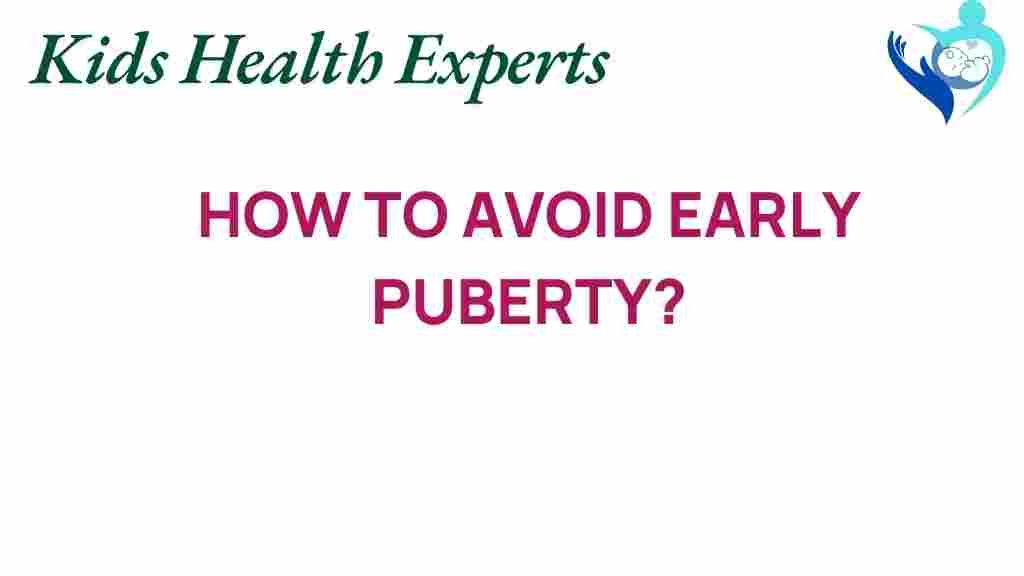Early Puberty: Understanding the Complexities of Growth and Health in Children
Early puberty, also known as precocious puberty, refers to the onset of secondary sexual characteristics before the age of 9 in boys and before age 8 in girls. This phenomenon has become increasingly common, leading to heightened concerns among parents and educators. Understanding the implications of early puberty, including its effects on growth, health, and emotional well-being, is crucial for effective parenting and education. This article will explore the complexities of early puberty, its causes, effects, and the importance of awareness and prevention strategies.
The Importance of Awareness in Early Puberty
Awareness of early puberty is essential for both parents and educators. Recognizing the signs and symptoms can lead to timely intervention and support. Here’s what you need to know:
- Physical Changes: Watch for the development of breasts in girls, pubic hair, and the onset of menstruation. In boys, signs may include testicular enlargement and facial hair growth.
- Emotional Changes: Hormonal changes during early puberty can lead to mood swings, anxiety, and behavioral issues.
- Social Implications: Children experiencing early puberty may face bullying or social isolation due to their advanced physical development compared to peers.
Understanding Hormonal Changes
The onset of early puberty is primarily driven by hormonal changes, particularly the early activation of the hypothalamic-pituitary-gonadal (HPG) axis. This leads to increased levels of sex hormones like estrogen and testosterone, which trigger physical development.
Common causes of early puberty include:
- Genetics: Family history can play a significant role in the timing of puberty.
- Obesity: Increased body fat can lead to hormonal changes that accelerate puberty.
- Environmental Factors: Exposure to certain chemicals and endocrine disruptors may influence the timing of puberty.
Impact on Growth and Health
Early puberty can have profound effects on a child’s growth and overall health. These include:
1. Growth Patterns
Children who experience early puberty may have a growth spurt earlier than their peers. However, this can lead to:
- Shorter Adult Height: Early maturation often results in a premature closure of growth plates, potentially leading to shorter stature in adulthood.
- Health Complications: Rapid growth can sometimes lead to musculoskeletal issues, such as joint pain or discomfort.
2. Mental and Emotional Health
The psychological impact of early puberty should not be underestimated. Children may experience:
- Body Image Issues: Children may feel self-conscious about their developing bodies, leading to low self-esteem.
- Increased Anxiety and Depression: The stress of being different from peers can contribute to mental health challenges.
Prevention and Management Strategies
While not all cases of early puberty can be prevented, there are strategies parents and caregivers can utilize to help manage its effects:
1. Promote Healthy Lifestyle Choices
Encouraging a balanced diet and regular physical activity can help mitigate some factors associated with early puberty:
- Balanced Nutrition: Provide a diet rich in fruits, vegetables, lean proteins, and whole grains.
- Physical Activity: Encourage at least 60 minutes of moderate to vigorous exercise daily.
2. Educate and Communicate
Open dialogue about puberty and development is essential:
- Educate Your Child: Discuss the changes they may experience in an age-appropriate manner.
- Encourage Questions: Create a safe space for your child to ask questions and express concerns.
3. Seek Professional Guidance
If you suspect your child is experiencing early puberty, consult a healthcare professional:
- Regular Check-ups: Schedule routine visits with a pediatrician to monitor growth and development.
- Endocrinologist Consultation: A specialist may provide further evaluation and treatment options if necessary.
Troubleshooting Common Concerns
As a parent, navigating the complexities of early puberty can be challenging. Here are some common concerns and how to address them:
1. Dealing with Social Isolation
If your child feels isolated due to their development, encourage participation in group activities where they can connect with peers:
- Extracurricular Activities: Sports, clubs, and classes can foster friendships and build confidence.
- Support Groups: Look for local or online support groups for parents and children experiencing similar challenges.
2. Addressing Body Image Issues
Help your child develop a positive body image by:
- Modeling Healthy Behaviors: Show your child that self-acceptance and body positivity are important.
- Encouraging Self-Expression: Allow them to explore fashion and personal style that makes them feel confident.
3. Managing Emotional Distress
If your child appears anxious or depressed, consider the following:
- Professional Support: A therapist specializing in child psychology can offer coping strategies.
- Mindfulness Practices: Teach your child relaxation techniques, such as deep breathing or meditation.
Conclusion
Understanding early puberty is a vital part of parenting today. By fostering awareness, promoting healthy lifestyles, and maintaining open lines of communication, parents can support their children through this complex phase of growth and health. Education about the hormonal changes and social implications of early puberty will empower both parents and children to navigate these challenges effectively. If you suspect your child is experiencing early puberty, don’t hesitate to seek professional guidance.
For more resources on this topic, consider visiting the American Academy of Pediatrics for further information on child development and health. Additionally, you can explore more parenting tips and advice on our site here.
This article is in the category Growth and created by KidsHealthExperts Team
